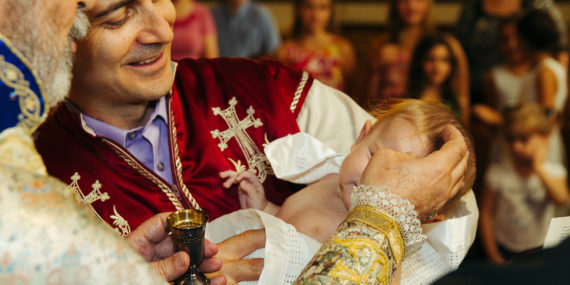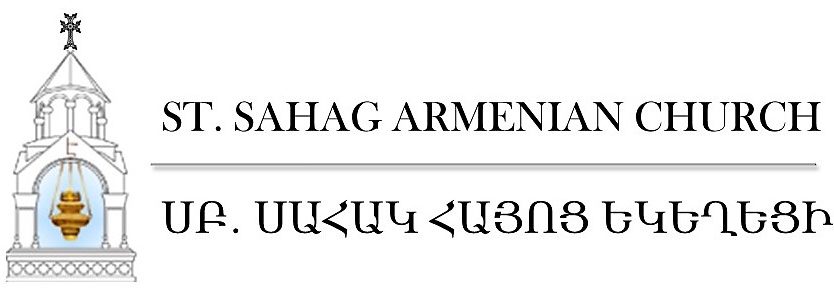
“Truly, truly, I say to you, unless one is born of water and the Spirit, he cannot enter the kingdom of God” (John 3:5).
Baptism is the first of seven sacraments of the Armenian Church, and it is through baptism that one begins his or her life in the Church. For this reason, baptism is sometimes called the “Door of the Church,” and the sacrament itself begins in the narthex of the house of worship.
Through baptism one is cleansed and absolved of the “original sin” that was committed by Adam and Eve in the Garden of Eden. The service represents Christ’s death, burial, and resurrection. The individual is immersed in sanctified water three times in the name of the Holy Trinity. This symbolizes the three days Christ lay in the tomb following the Crucifixion.
The ceremony of immersion is accompanied by the following prayer: “This servant of God, coming from the state of catechumen to baptism, is being baptized in the name of the Father and the Son and the Holy Spirit and, being expiated by the blood of Christ from the captivity of sin, receives the adoption of the Heavenly Father, becoming co-heir with Christ and a temple for the Holy Spirit.”
Also during the time of baptism, the individual is anointed with holy chrism (muron). This ceremony links the newly baptized to generations of Armenian faithful, including the Apostles of Christ who first brought the muron to Armenia. At the conclusion of the service, the newly baptized individual receives Holy Communion. Thus, the newly baptized is fully prepared to take part in the life of the Armenian Church.
Christian parents are encouraged to baptize their children by the eighth day or up to the 40th day after birth. The godfather at the baptism must be a member of the Armenian Church, and should not be a blood relative so that he can create a new spiritual relationship with his godchild. It is the godfather’s responsibility to oversee his godchild’s spiritual growth.
GUIDELINES FOR BAPTISM AT ST. SAHAG
Click below to fill out the Baptismal Application

1. A date shall be set for baptism in joint consultation with the Pastor and arrangements must be made three months prior to the sacrament.
2. All baptisms are to follow the Canons of the Armenian Apostolic Orthodox Church. The Sacraments will be explained by the Pastor.
3. Baptisms can take place on any day of the week. According to the canon, practice and tradition of the Armenian Church, the Sacrament should be administered anytime during the eighth to the fortieth day after the birth of a child. We do not recommend delaying or deferring the rite for a later time in order to safeguard the spiritual salvation of the child.
4. According to a directive of the Eastern Diocese, one of the Godparents (Godfather or Godmother) of the child to be baptized must be a baptized and chrismated member of the Armenian Apostolic Orthodox Church. Each child to be baptized will have only one Godmother and one Godfather. If only one of the Godparents is a baptized member of the Armenian Apostolic Orthodox Church, the other Godparent must have been baptized in the Christian faith.
5. The Armenian Church has no explicit provisions for a Godmother at Baptism. We can consider a Godmother the person who takes care of the child during the performance of the Order of Baptism by holding the child during the ceremony, and dressing and undressing the child at the prescribed times.
6. The Godparents at Baptism, like the parents, accept a responsibility in teaching and sharing the Faith with their Godchild. It is expected that they watch the spiritual growth and development of the child by their own Christian example, by education and full participation in the life of the Church and parish community.
7. The specific items needed for baptism (should be provided by the Godparents) are the following:
Infants:
• A chain and cross for the Neophyte (Newly Baptized). The cross must be Armenian in style.
• “Crucifix” style crosses are not part of the tradition of the Armenian Church.
• The Robe of Gladness”-a white outfit to be worn after the Chrismation.
• One or two new large white towels not to be used for any other purpose.
• A “Narod” will be provided by the church. It is recommended that the Pastor meet with the parents and Godparents at least once, prior to the Baptism, in order to explain the Sacrament.
• Adults: To be instructed by the Pastor
8. The full washing of the child is to be done at home on the third day after the Baptism preferably with Godparents present. The water used for the bath is not to be emptied down the drain but is to be collected and poured in the soil of a garden or lawn. The reason for this is that there may still be some Holy Muron left on the child’s body which was transferred into the water. Also, when the undergarments of the child are washed for the very first time after the Baptism, the water should be dispensed in the same manner.
9. Photographs may be taken at any time during the ceremony. Caution should be used by the photographer (or videographer) not to blind the eyes of the Priest, Deacon or any other member of the baptismal party. At no time nor for any reason will the photographer ascend the steps of the Altar or be at the Altar itself.
10. A baptism is a sacrament of the Armenian Church and a public service and no person may be excluded from the Church, except where the invited list approximates the seating capacity and if cards of admission have been issued.
11. All donations are the responsibility of the person involved. It is a tradition in the Armenian Church that the Godparents incur the costs of the church portion of the expenses as well as any participating clergymen.
12. The gift to the Pastor shall be left to the family’s discretion. The fee for the services of a visiting or guest priest is according to the individual wishes of the family (the customary minimum gift is $200.00) plus travel expenses.
13. Before any guest priest is engaged, the Pastor must be consulted. According to protocol of the Armenian Church, the Pastor must be the one to invite any guest clergy. If the guest priest is a member of the Armenian Church, he may be invited to perform all or part of the service. In addition to an Armenian Priest, should a priest of a different Christian denomination be invited, the Pastor shall decide the appropriateness of his participation. The Pastor will assign to him those portions he sees fit according to the Canons and traditions of the Armenian Church and it should be clear that any priest of a different denomination is an invited guest and not a co-celebrant.
14. If the Pastor, deacon or other guest clergy are to be invited to a reception, he (they) should be notified in advance.
